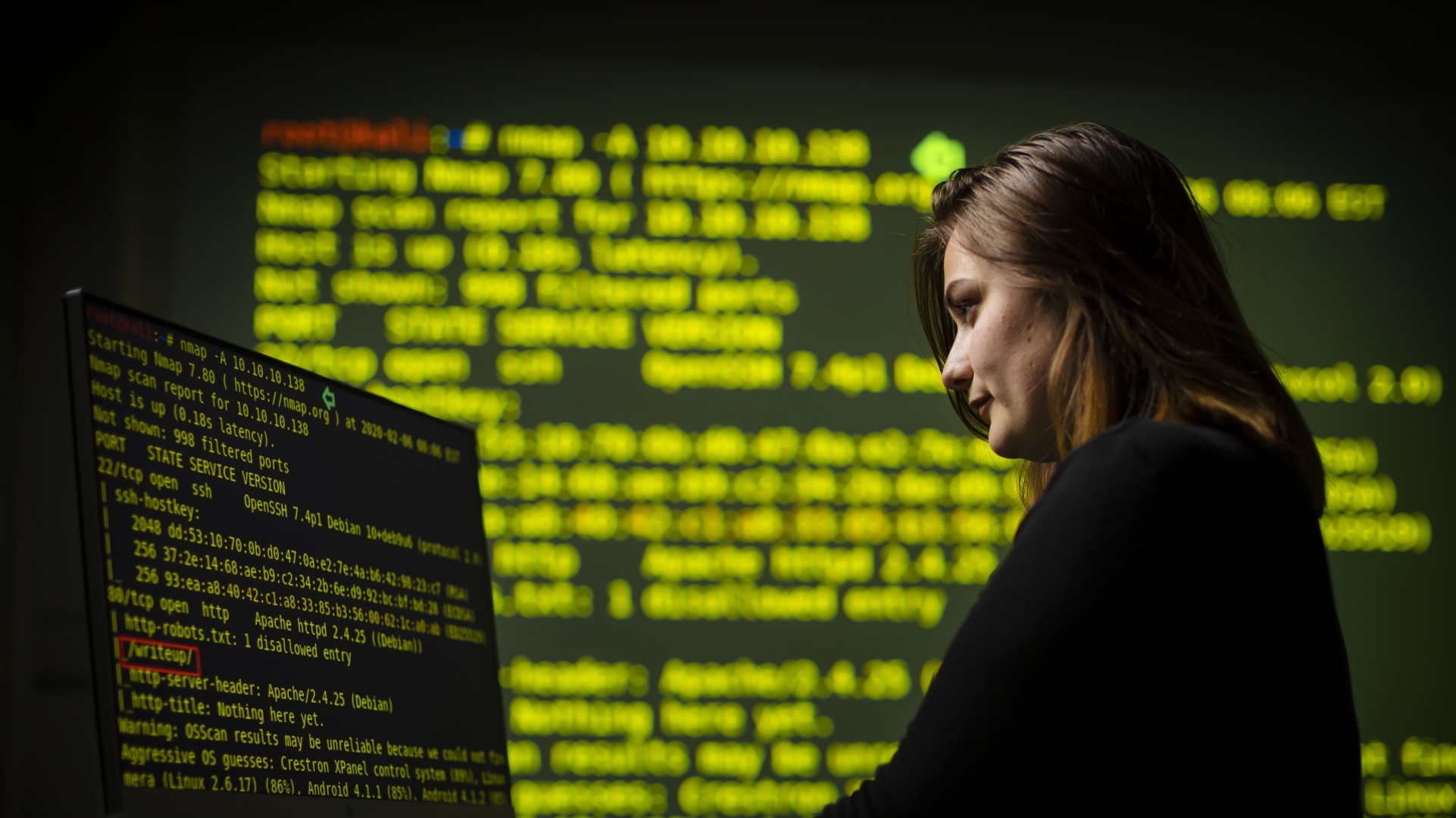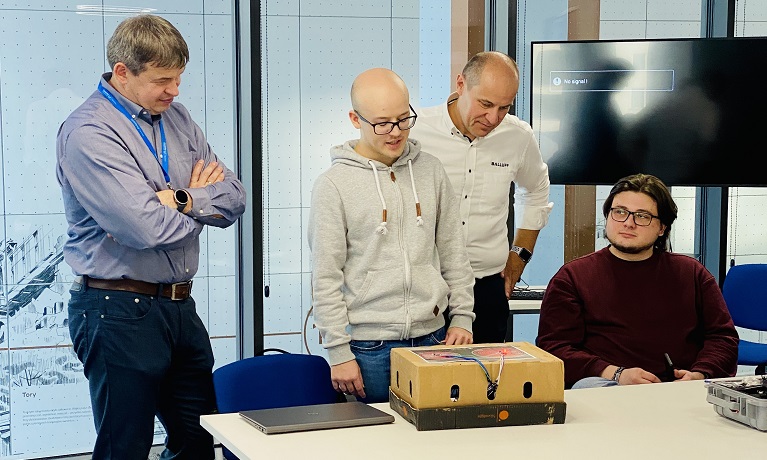Search
Computing Science BSc (Hons)

Computing science is the study of theory, experimentation, and engineering used in the design and use of computers.
Course features
Year of entry
Location
Coventry University Wrocław (Poland)
Study mode
Full-time
Sandwich
Duration
3 years full-time
4 years sandwich
Course code
CUPU043
Start date
January 2026
March 2026
May 2026
June 2026
Course overview
The growth of digital technology has led to demand for skilled professionals who understand core computing technologies and have the hands-on expertise to tackle software challenges effectively.
- This course will provide you with the opportunity to explore Computing Science from both an academic and a practical perspective.
- You will draw upon and develop a detailed knowledge of subject-related theory, technology, development methods and a range of professional and intellectual skills.
- The degree is designed to introduce you to work in this exciting and constantly changing field. Throughout the programme, we teach the academic, professional and personal skills required to develop within this evolving industry.
- With a computer science degree, you can explore a range of specialisms depending on your career goals. Industries looking for talented programmers include AI, computer security, machine learning, healthcare, and financial services.
Why you should study this course
We offer a style of education which is flexible and designed to fit around your life, allowing you to benefit from a modern, forward-thinking higher education institution, reinforced by the quality and reputation of Coventry University.
- We aim to provide career-focused courses, coupled with placement opportunities1 to help prepare you for the world of work.
- We are dedicated to making higher education accessible and enjoyable to everyone, so we keep our fees low.
- We've made it a policy to cover one module at a time, allowing you to study each topic in each topic before moving onto the next.
- Learn in our Cyber lab, a dedicated teaching space designed to give computing and cyber students a practical learning experience for conducting research, testing and experimentation related to cyber security.3
What you'll study
We regularly review our course content, to make it relevant and current for the benefit of our students. For these reasons, course modules may be updated.
Artificial intelligence device prototype
A device using artificial intelligence to recognise faces and open house doors is among prototypes designed by students at Coventry University Wrocław.
Read the story
How you'll learn
Our teaching methods are varied.
As a full-time undergraduate student, you will study modules totalling 120 credits each academic year. A typical 30 credit module requires a total of 200 hours study. This is made up of teaching contact hours, guided and independent study.
Teaching contact hours
Teaching hours vary each semester, year of study and due to module selection. During your first year you can expect 15-18 teaching hours each week. You will also have the option to attend optional sessions including time with a progress coach or to meet with staff for advice and feedback. As you progress through your studies, teaching hours may reduce.
Guided and independent study
Throughout your studies, you will be expected to spend time in guided and independent study to make up the required study hours per module. You’ll be digging deeper into topics, review what you’ve learned and complete assignments. This can be completed around your personal commitments. As you progress through your studies, you’ll spend more time in independent study.
Online learning
As an innovative university, we use different teaching methods including online tools and emerging technologies. So, some of your teaching hours and assessments may be delivered online.
Assessment
This course will be assessed using a variety of methods which will vary depending upon the module. The Assessment methods may include:
- phase tests
- essays
- group work
- presentations
- reports
- projects
- coursework
- individual assignments.
The Coventry University Group assessment strategy ensures that our courses are fairly assessed and allows us to monitor student progression towards achieving the intended learning outcomes.
Entry requirements
Typical entry requirements:
Fees and funding
| Student | Full-time | Part-time |
|---|---|---|
| EU | 27,500 zł (EU) per year | Not available |
| International | 46,000 zł (non-EU) per year | Not available |
Coventry University Wroclaw will review tuition fees each year. Coventry University Wroclaw may increase fees for each subsequent year of study but such increases will be no more than 5% above inflation. Please note that the calculation of inflation is based on the information on price indices of consumer goods and services published by the President of the Statistics Poland on the website www.stat.gov.pl for the quarter preceding the fees’ valorisation. Students who are not satisfied with the changes will be offered the opportunity to withdraw.
If you choose to study a course with a placement/sandwich year, you will need to pay a tuition fee2 of 2000 zł to cover your academic support.
For advice and guidance on tuition fees and student loans visit our Undergraduate Finance page and see the University’s Tuition Fee and Refund Terms and Conditions.
We offer a range of scholarships to students. For more information, visit our Scholarships page.
Tuition fees cover the cost of your teaching, assessments, facilities and support services. There may be additional costs not covered by this fee such as accommodation and living costs, recommended reading books, stationery, printing and re-assessments should you need them.
The following are additional costs not included in the tuition fees2:
- any optional overseas field trips or visits: zł2011+ per trip.
- any costs associated with securing, attending or completing a placement (whether in Poland, the UK or abroad)
Facilities
Located on the two floors of a state-of-the-art building, the Coventry University Wrocław campus supports the needs of students and provides facilities to complement the current courses being taught.
- breakout social spaces
- a library that includes loan laptops
- open access computers with internet
- purpose-built IT suites
- access to printers
- student support
Careers and opportunities
On completion, you should be able to:
- Use an enquiring, critical and reflective approach to computing science.
- Develop practical skills to solve complex workshop-based problems.
- Appraise a problem and debate alternative, sustainable solutions.
- Develop key practical and transferable skills to enhance your long-term employability or to progress to specialist, postgraduate study.
Globally recognised, the technology industry boasts several compelling benefits. In addition to impressive graduate prospects and elevated salaries, computer science graduates could have numerous opportunities in a diverse range of fields.
This varied industry means you can expand into several specialist areas. Possible career paths include Mobile and Software Application Development, Video Game Designing, Database Administration, Web Development, Network and Computer Systems Administration and IT Security.



